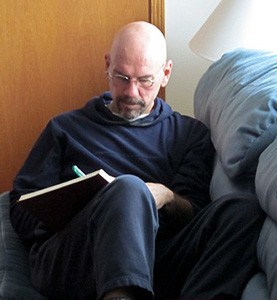Meditating on our precious human life

Senior Dharma student Tom Woodbury prepared this text for guiding a meditation on our precious human life. You can use it in your own practice, reading a little at a time and contemplating it, then going on to the next point and contemplating it. It's a wonderful way to dispel the mind that tends to worry.
Contemplating precious human life is in essence a practice in rejoicing. If you’re like me, you probably spend a lot more time worrying than rejoicing. But if we want to live life joyously—and who doesn’t—the road is not paved with worries. The first step to Joyville is really quite simple. Our worldly lives seem to be fueled by worry. So the least we can do before we jump on the expressway of worries every day that is left in our lives is to sit down for our morning practice and spend a few minutes rejoicing over our precious human life. This is not only one of the most profound daily practices we can do, it is also one of the most commonly neglected. But if we do it sincerely, it just might have the effect of neutralizing that worrying mind, or at least putting those worries in perspective.
The first thing to understand, of course, is that not all human life is precious human life. What makes a human life precious are the very things we tend to take for granted, at least those of us fortunate enough to live in this land of plenty.
We don’t have to worry about where our next meal is coming from, or what’s in our water. So many children born in Africa do not enjoy precious human life. Fifteen thousand die every day from malnutrition or water-borne disease.
We don’t have to worry about soldiers or renegades invading our village, or planes dropping bombs on our schools.
We don’t have to worry that government agents are going to burst into this meditation hall or our homes and imprison us for possessing pictures of and books by His Holiness the Dalai Lama. Think about that—we have a better opportunity to practice the dharma than monks and nuns living in Tibet!
So how do our worries stack up against those of African mothers, Afghani school teachers, or imprisoned Tibetan monks and nuns?
Every moment I spend worrying about my worldly life instead of rejoicing over my precious human life is not only obscene from a global perspective, is not only a wasted opportunity, it is an act of planting yet another seed of non-virtue in my vast, fertile field of negative karmic fruits.
And here’s an even bigger secret, according to our teachers (who we probably don’t appreciate enough!). All those problems we worry about? They are also worthy of rejoicing over! The most precious human life is one that is balanced between incredible good fortune and just enough adversity, dissatisfaction, and suffering to get us here on retreat every year or so. That is why of the two higher rebirths in the desire realm, humans and gods, we’ve got the best seats in the house. Our suffering is not gross suffering, at least up till the time of death. After all, we live in a time and place of historically unprecedented comfort, convenience, and abundance. No, our suffering is unsatisfactoriness, for the most part. Not enough meaning in our worldly lives. And it is that pervasive unsatisfactoriness in our experience of the world that gets us to Sravasti Abbey, that puts us at the feet of a well qualified spiritual master, that exposes us to the Four Noble Truths and the three kinds of great compassion. And that makes us the luckiest people alive on this planet right now … no matter how you feel about these degenerate times.
In fact, it is precisely this degeneration in the world today that makes the Dharma the wish-fulfilling jewel that it is. Here is the key to true, lasting, meaningful happiness. Here lies the doorway that leads away from pervasive unsatisfactoriness.
So let us resolve to begin each and every day remaining in our fleeting lives reminding ourselves what is at stake here, and rejoicing at our incredible good fortune to have just enough adversity in our lives to drive us to our cushions.
It’s not a crazy joy we feel, not an excited happiness. We aren’t like those delusional people on so-called reality TV, after all.
It’s a quiet joy. It’s the joy of satisfaction that comes from feeling that we are taking full advantage of the opportunities that have been made available to us in this precious … human … life …
Rest in that feeling for a few minutes.
Zhiwa Woodbury
Zhiwa is a long-time student of Ven. Thubten Chodron who has devoted his life to being an advocate for all things natural - including human nature! He has taken turns as an environmental attorney, a climate psychologist, and a writer/journalist. He is a life-long meditator who backpacked around the world in 1991 and met the Dharma on Cloud Mountain with Ven. Chodron in 1999, which he says was a turning point in his life and in his career. He fully embraced the Lamrim at that time, began studying with His Holiness the Dalai Lama, presented on climate grief at the Mind & Life Institute, and is currently a devoted student of Her Holiness Kunga Bhuma, the first female state oracle of Tibet. Zhiwa blogs under the pen name Tham Zhiwa @ The Dharma Beat on Substack, and his academic papers are freely available on Academia.edu.


